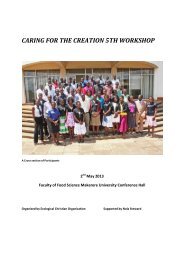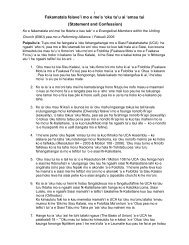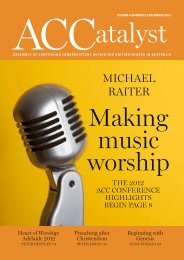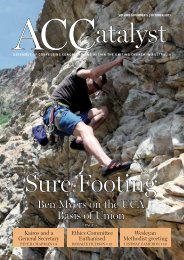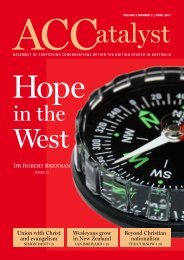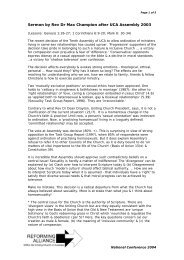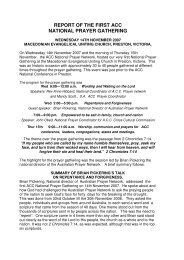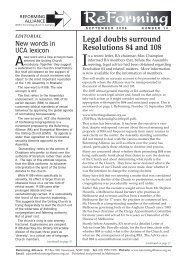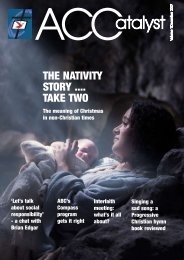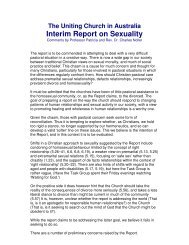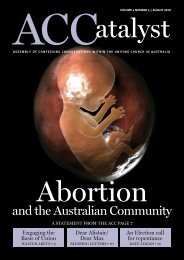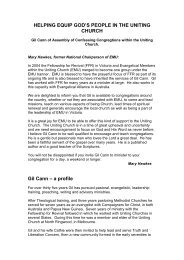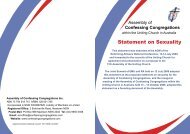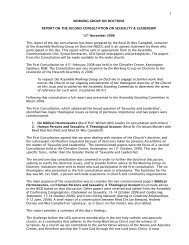where are we now? - Assembly of Confessing Congregations
where are we now? - Assembly of Confessing Congregations
where are we now? - Assembly of Confessing Congregations
Create successful ePaper yourself
Turn your PDF publications into a flip-book with our unique Google optimized e-Paper software.
Congregationalists, Methodists and Presbyterians represented 19.4% <strong>of</strong> the population; in 1981, the<br />
Uniting Church represented 15.2%; in 1986, 13.1%; in 1991, 8.2%; in 2001, 6.6%.<br />
Plainly, union is not in itself a cause <strong>of</strong> growth. While I am sure it pleases the Father for his children<br />
to work together, it must be in a spirit <strong>of</strong> faith and in the po<strong>we</strong>r <strong>of</strong> the Holy Spirit. Tying two sinking<br />
ships together will not stop them sinking.<br />
In a Sydney Presbytery meeting a few years back, one speaker told how a Muslim family <strong>we</strong>re<br />
attending his church and he actually tried to talk them out <strong>of</strong> being baptized (presumably so they<br />
would feel accepted as they <strong>we</strong>re). As it happened, they insisted on baptism and he <strong>we</strong>nt ahead.<br />
More recently, there has been the debate on the proposed new Preamble to the Constitution. The<br />
syncretism implied in this document seems to be seen as a virtue by many people. Yet it clearly flies<br />
in the face <strong>of</strong> the Great Commission.<br />
In a statement prep<strong>are</strong>d by Wesley Mission, <strong>we</strong> read –<br />
1. All things, all cultures, all traditions and customs, all people(s), <strong>are</strong> fallen and broken<br />
through the grip <strong>of</strong> sin (Romans 3: 23, 8: 18-21) and <strong>are</strong> transformed in Christ (Acts 17: 30,<br />
Colossians 1: 19-20, Revelation 21: 5). In this regard there is no distinction bet<strong>we</strong>en<br />
particular groups along the lines <strong>of</strong> culture, social status, gender, age, sexuality etc (Gal. 3:<br />
28). It is misleading to suggest that any culturally identified pre-Christian group had<br />
‘particular insights into God’s ways’ (Clause 3). The only possible exception would be the<br />
Hebrew people whose particular story explicitly paved the way for the Messiah to come.<br />
2. Clause three shows Aboriginal and Islander religious beliefs as almost on a continuum with<br />
Christian belief. This is inconsistent with the gospel that requires all people(s) to repent <strong>of</strong><br />
their old ways and turn to the new (Mark 1: 15; Act 2: 38; 3: 19; 2 Cor 3: 17).<br />
3. Repentance and faith, expressed through baptism, still represent the only way to come to<br />
God (Act 9: 18; 10: 47-48; 18: 8; 19: 5; Romans 6: 3-4).<br />
Synod and Presbytery meetings I have attended r<strong>are</strong>ly devote much time to evangelism or outreach.<br />
Given the declining nature <strong>of</strong> the Church, I find this astonishing. Surely it should be our first priority?<br />
The other day, I was initially heartened to receive a copy <strong>of</strong> an <strong>Assembly</strong> document called Towards a<br />
Theology Relating to Mission. 5 At first glance, it appears positive and encouraging. On closer<br />
inspection, ho<strong>we</strong>ver, worrying omissions <strong>are</strong> seen. The document talks plainly <strong>of</strong> reconciliation and<br />
decl<strong>are</strong>s that the po<strong>we</strong>r <strong>of</strong> sin and death <strong>we</strong>re defeated (#6) but does not say how. While the<br />
Scripture decl<strong>are</strong>s that Christ died for our sins, and that this is <strong>of</strong> ‘first importance’ (1 Corinthians<br />
15:3), the document does not. Nor is there any mention <strong>of</strong> the concept <strong>of</strong> atonement or <strong>of</strong> Christ<br />
becoming sin for us or bearing our sins in his own body on the tree (Isaiah 53:4, 5; 2 Corinthians<br />
5:21; 1 Peter 2:24).<br />
Mission speaks much <strong>of</strong> us entering a new creation, but little <strong>of</strong> us becoming a new creation (2<br />
Corinthians 5:17; Romans 6:4). It does tell us that through baptism <strong>we</strong> celebrate dying to sin and<br />
5 C.Walker et al, Towards a Theology Relating to Mission, <strong>Assembly</strong> <strong>of</strong> the Uniting Church in Australia<br />
Standing Committee, March 2010.



